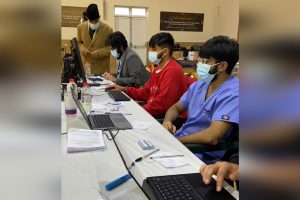
Sarah Waseem, UK
Across the world many countries are in lockdown as a result of the Covid19 pandemic. Whilst this has had an impact at all levels of our lives, there has been considerable concern about the potential impact of lockdowns on the mental health of children who have had their schooling online and have been separated from their peer networks. So, what does the evidence suggest and what can we do about it?
The organisation Young Mind carried out a survey with 2,011 young people with a history of mental health problems between Friday 15th September and Wednesday 30th September, 2020, shortly after schools had reopened. Their findings are concerning. They revealed that on returning to school, 69% of respondents described their mental health as poor. That figure had risen from 58% who described their mental health as poor before returning to school. Of concern, the report noted that only 27% had had a one-to-one conversation with a teacher or another member of staff in which they were asked about their wellbeing [1].
The Children’s Society’s [2] annual household survey conducted in April-June 2020 with over 2,000 young people aged 10-17, and a consultation with 150 children found that many children have experienced high levels of worry; suffered loss and bereavement; and missed out on learning and education opportunities throughout this crisis.
The pandemic has challenged our illusion that we are in complete control of our lives. The outside world is now presented to us as a dangerous place to be – and other people are potentially dangerous as they can spread the virus which, as we are only too painfully aware, kills. There is no clear end point –and along the way there is likely to be even greater suffering due to a worldwide economic decline.
So what can parents and guardians do? Many, due to their home circumstances may be feeling extremely stressed especially if they are living in overcrowded spaces with little access to safe outdoor play areas. Added to this may be worries about low income or a future job loss.
The British Psychological Society [3] (BPS) has suggested a number of useful strategies. Firstly, parents and guardians need to be aware of their own responses to stress, and those of their children. Many parents may be worried about their own job prospects, but they need to contain their anxieties and seek help if needed. These problems are not things that children can solve, but we know, that when children hear adults vocalise their worries a lot, they usually start to worry about them too.
The BPS suggests that while it’s important to be open that some things worry adults, children should not feel overwhelmed with lots of information and discussion about uncertainty.
Statements like, ‘I don’t know what I’m going to do’ can be very scary, as your child will look to you for that containment of how they feel. Be honest but try to help to support their anxiety. ‘Yes it’s something I think about too and sometimes worry about, but when we know what the next step is we can make the best possible plan together. ‘
Praise them for having noticed your feelings. This helps them know that you are not upset with them about it and lets them know they can trust their instinct’s.
Another challenge many parents are facing is having to provide home schooling. Again, parents did not choose to become home educators. Therefore, they need to set themselves realistic goals as to what is achievable and not to ‘beat‘ themselves up for failing to engage their children.
Routine and structure, can help a lot with this as creates a sense of safety. However, it is also important to be flexible and not to feel the need to adhere too rigidly to a set plan for the day as it may cause more stress and conflict. Spending time with children and talking to them is especially important as is checking in with them as to how they are feeling.

It is of note that the Summer survey by Young Minds found that 11% of respondents said that their mental health had improved during the crisis, an increase from 6% in the March survey. This was often because they felt it was beneficial to be away from the pressures of their normal life (e.g. bullying or academic pressure at school). Play activities are especially important for development for children of all ages. Play allows children to develop manual skills, verbal skills and creativity.
It is really important to normalise this experience that we are all going through and the reality is that we are not alone. Most of the world’s population is experiencing the pandemic in some form or another. Ironically, this shared experience unites us in ways that we could not have envisioned before. Children can be encouraged to reflect on this and to think about their place in the global village that we are now all part of. We are living through a significant moment in history and this is something that children could be encouraged to talk about this via virtual connection with their peers, family and friends.
Indeed, the pandemic has made us rethink aspects of the way that we live. Judith Edwards PhD, is a retired consultant child and adolescent psychotherapist, who taught and supervised at the Tavistock Clinic reminds us,
‘…it is important to convey to children the good that has indeed also taken place. Even in cities the air became purer, more breathable, and while the streets emptied our lungs expanded so that we too experienced the energy of the lithe young deer, childish joy- or at least more energy than we’ve been experiencing hitherto.’ [4]
Perhaps one of the greatest impacts of the Covid-19 pandemic has been to challenge our sense of certainly. Parents can use this as time to remind their children that there is only One who has absolute knowledge. Only He knows what will happen next and the best way we can alleviate our anxieties is to hand over our imagined sense of control to Him. When our children observe us turning to Him in prayer they will also learn that there is no certainty in the world without Allah
We are reminded in the Holy Qur’an:
‘O ye who believe! seek help with patience and Prayer; surely, Allah is with the steadfast.’ [5]
And then:
‘And We will try you with something of fear and hunger, and loss of wealth and lives, and fruits; but give glad tidings to the patient, Who, when a misfortune overtakes them, say, ‘Surely, to Allah we belong and to Him shall we return.’ It is these on whom are blessings from their Lord and mercy, and it is these who are rightly guided.’[6]
About the Author: Dr Sarah Waseem is a Clinical Psychologist with over 25 years experience in the NHS in both Primary Care and Secondary Care Settings. She is currently working in Women’s Health at an NHS London Hospital. She has also served as a senior editorial board member for the The Review of Religions for over 20 years.
ENDNOTES
[1] https://youngminds.org.uk/about-us/reports/coronavirus-impact-on-young-people-with-mental-health-needs
[2] The Children’s Society, 2020
[3] The British Psychological Society 2020: Managing uncertainty in children and young people: advice for parents during the Covi19 pandemic
[4] https://www.mindinmind.org.uk/thought-pieces/the-impact-of-covid-19-on-childrens-mental-health-before-during-and-after-the-pandemic/
[5] The Holy Qur’an 2:154
[6] The Holy Qur’an 2:156-158




Add Comment